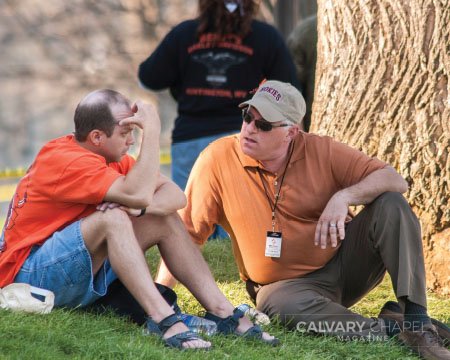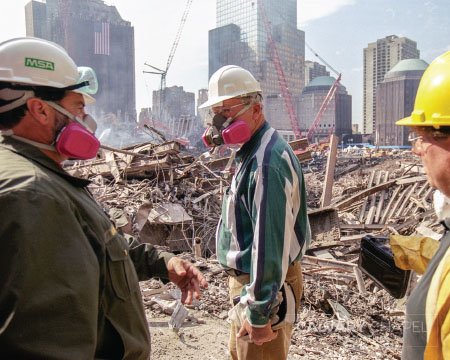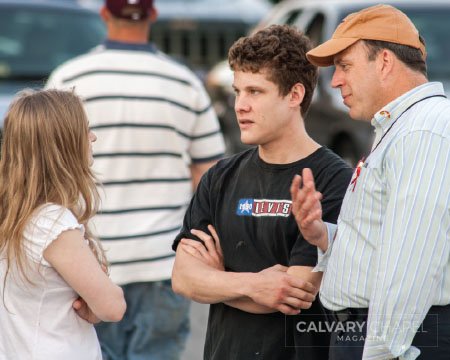Becoming a Chaplain
Hundreds of Calvary Chapel believers have been trained as chaplains by the Billy Graham Evangelistic Association and are deployed to minister to the hurting when disaster strikes. As catastrophic events continue to increase worldwide, more men and women are needed to share the comfort of Christ, say leaders.
Story by Christmas Beeler
Photos by Tom Price
Pastor Frank Ippolito of CC Vineland, NJ, stood beside a victim’s family at Ground Zero in 2001, a small wooden urn in his hand. Their faces were streaked with tears. Frank prayed silently, asking the Holy Spirit to guide his words. Then he prayed to the Father aloud, asking comfort for the family. He placed the urn—filled with dust from the fallen Twin Towers—into their hands. They thanked him and walked quietly away into the streets of New York. A few minutes later, another family came forward.
 “Families wanted closure, so we did the best we could for them,” recalled Frank. “I would have a mini funeral for them right there on the grounds. There was probably one every 30 minutes. You can imagine the intensity of that.” Frank and several other pastors and trained chaplains responded to the massive need for counseling, compassion, and prayer at Ground Zero after 9/11. Soon after, the Billy Graham Evangelistic Association (BGEA) created a Christian chaplain training program to equip men and women to offer Christ’s hope after a large disaster.
“Families wanted closure, so we did the best we could for them,” recalled Frank. “I would have a mini funeral for them right there on the grounds. There was probably one every 30 minutes. You can imagine the intensity of that.” Frank and several other pastors and trained chaplains responded to the massive need for counseling, compassion, and prayer at Ground Zero after 9/11. Soon after, the Billy Graham Evangelistic Association (BGEA) created a Christian chaplain training program to equip men and women to offer Christ’s hope after a large disaster.
Pastor Frank is one of hundreds of Calvary Chapel believers who have been trained as a Billy Graham Rapid Response Team (BGRRT) chaplain. Having been in full-time ministry for more than 30 years, Frank describes chaplain ministry as uniquely “intense” and a wonderful opportunity “to bring Christ into a traumatic situation.” He reflected, “A chaplain is a hug from God for someone whose heart is broken.” Frank has also served after Hurricanes Katrina and Sandy, the Sandy Hook and Virginia Tech shootings, fires in San Diego, and civil unrest in Ferguson, MO. He added, “When we can come on the scene and show compassion without judgement, it’s powerful.”
The BGEA deploys these chaplains to disaster areas to share Christ’s compassion and hope with those affected by a disaster. Jack Munday, international director of the BGRRT program, related, “By God’s grace, we’ve responded to about 280 disasters in 22 countries since we started the program after 9/11.” Nearly 2,200 Christian men and women in the U.S. have been trained as BGRRT chaplains, with a total of 2,600 worldwide. Having “an army” of trained, like-minded chaplains is key to having a quick response time—often within 24-48 hours of a tragedy, Munday explained.
More Chaplains Needed
Joe Focht, senior pastor of CC Philadelphia, PA, and CCA board member, echoed Jack’s plea for church involvement: “We know in these end times that these calamities are only going to increase.” Joe stated, “We need to get our Calvary Chapel church volunteers officially certified with BGEA so that we can respond to these horrific situations. This training teaches how to sensitively bring the love of Christ into every situation.”
 Large-scale disasters like hurricanes, wildfires, earthquakes, and floods have been occurring frequently in recent years, commented Jerry Paradise, an assistant pastor at CC Philadelphia. He added, “Jesus said there were going to be ‘birth pangs’ (Matthew 24:8, NASB) getting more intense as His coming approaches. So the more chaplains trained, the better prepared we would be.” He urges other Calvary Chapel churches to host trainings in their regions.
Large-scale disasters like hurricanes, wildfires, earthquakes, and floods have been occurring frequently in recent years, commented Jerry Paradise, an assistant pastor at CC Philadelphia. He added, “Jesus said there were going to be ‘birth pangs’ (Matthew 24:8, NASB) getting more intense as His coming approaches. So the more chaplains trained, the better prepared we would be.” He urges other Calvary Chapel churches to host trainings in their regions.
CC Philadelphia hosts BGRRT chaplain training at their fellowship every two years. “After 9/11, we were sending hundreds of people from our church into New York,” recalled Jerry. “More than 700 people signed up for the first training. Now we host it every two years and see between 150-200 new, interested attendees.”
What kind of person would make a good chaplain? Jerry suggested that one should be a mature believer with a strong foundation in the Bible, along with discernment and a gift for evangelism. Frank said, “Do you have a heart of compassion for people in crisis? That is the most important thing. At the same time, you need to be able to see the larger picture of what God may be doing in that person’s life. Many people come to the Lord through crisis.” He added, “You also need to have a tough stomach, thick skin. You may hear foul language or people saying, ‘Where was God?’ You need to be able to not enter into debates but offer God’s comfort and truth.”
Chris Cannatella of CC Philly related that the BGRRT training has not only made him more effective in ministering to his friends and family locally but has also opened doors to serve with local law enforcement. He added, “During the training, the instructor asked for a show of hands … for those who got saved at their lowest point, when it looked like there was no hope. Almost every hand went up. I always remember that. When we’re at our lowest point, Jesus Christ reaches down and pulls us out of our mess.”
He also brought me up out of a horrible pit, out of the miry clay, and set my feet upon a rock. Psalm 40:2a
Jack Munday related, “One woman who just finished serving at the Texas church shooting told me that it was one of the most difficult ministry weeks she’s ever had in her life, but also rewarding to see God work in the midst of suffering.” That’s why serving as a chaplain “has to be a calling, ministering to people who are going through the most difficult time of their lives.”
Blessed be the God and Father of our Lord Jesus Christ, the Father of mercies and God of all comfort, who comforts us in all our tribulation, that we may be able to comfort those who are in any trouble, with the comfort with which we ourselves are comforted by God. 2 Corinthians 1:3-4

Showing Christ’s Love
Jerry emphasized the importance of presence and listening: “In their crisis, it may be the first time they are calling out to God or thinking about God, so we as a church have to be there to share the hope of Christ.” Listening not only shows love, but helps traumatized people process and heal. After Hurricane Katrina, Jerry rode along with a sheriff’s deputy: “For two hours, he talked for an hour and 50 minutes, and I talked for 10. And my 10 minutes was asking a question and then being quiet, letting him run with it. The next day, the same thing happened. He told someone I was the best counselor he’d ever had,” Jerry said with a smile. “All I did was let him vent—get it out of his system, express his pain and anxiety and fears. … I know from being trained as a chaplain how valuable that is.”
 Since chaplains have special permission from local governments to serve traumatized victims, Frank added, “You have to let the Holy Spirit lead you; you can’t be too pushy with the Gospel. When it’s too pushy, it can have the opposite effect. It can be seen as taking advantage of someone in crisis.”
Since chaplains have special permission from local governments to serve traumatized victims, Frank added, “You have to let the Holy Spirit lead you; you can’t be too pushy with the Gospel. When it’s too pushy, it can have the opposite effect. It can be seen as taking advantage of someone in crisis.”
Learning Words that Heal, not Harm
Sadly, related Jack Munday of the BGRRT, “Even well-meaning Christians can say hurtful things.” He recalled how a widow’s fellow church members drove her grieving daughter from church by saying that at least her mother was young enough to remarry. “They may have had good intentions, but that’s not what she needed to hear,” Jack said. “It was hurtful, too soon. We need to pray and think about what we say to not hurt those who are already hurting.” BGRRT training combines crisis-intervention tools with a biblical worldview, Jack said, since it’s important to have both. He advised, “You may have a great heart for people, but crisis-intervention training helps prepare you to respond to the most unimaginable crisis you can think of—when you’re talking to a man whose wife and two daughters were killed in a church shooting, or a mother whose baby was ripped from her arms in a tornado. The training helps prepare you for intense grief.” Too often, Christians try to help by quoting Scripture, but when done without discernment, this can result in being inappropriate or hurtful. Jack cautioned, “For example, you might quote Romans 8:28, that all things work out for good. That’s biblical truth, but if you share that in the first 24 hours of their loss, it stings. At the same time, mere psychology has no eternal value. Therefore, we teach clinical concepts with a biblical foundation.”

To be a BGRRT chaplain, a person must complete the Sharing Hope in Crisis Seminar as well as two Critical Incident Stress Management courses. An application process is required, including an interview and references. “We ask several questions about the applicant, such as whether the person has a servant’s heart, and if they will follow instructions,” Jack added.
The Sharing Hope in Crisis seminar has six sessions, including a biblical view of crisis response and suffering, symptoms and effects of trauma, appropriately sharing God’s hope, active listening with helpful questions, and using words that heal instead of harm. Churches may request to host a BGRRT training event; individuals can register for posted trainings at billygraham.org/RRT or take a Sharing Hope in Crisis online course.
Jerry added, “The body of Christ never looks better in the eyes of the unsaved world as when we are responding to their critical needs—sometimes as simple as food and water—in their time of crisis. They cannot help but respond to our love and care representing God’s love and care for them.”
Billy Graham Rapid Response Team

